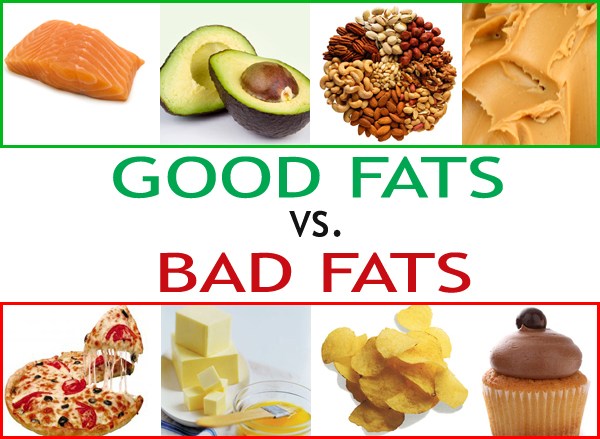Fat is a nutrient with important functions. It’s a rich source of energy. In fact, fats produce more than double the energy acquired from carbohydrates or proteins. It’s a carrier for vitamins A, D, E and K. It provides linoleic and alpha-linolenic acid, essential polyunsaturated fatty acids. It contributes flavor and a sense of “fullness” when part of eating healthy diet
However, it’s important to know that there are good fat foods and bad fat food.

What are good fat foods to eat?
As part of eating a healthy diet, you need to consume moderate amounts of good fats. These good fats include:
Monounsaturated fat — This is the primary fat source found in olive oil. Unsaturated fat, can help lower LDL (bad) cholesterol. In fact, due to its high concentration of monounsaturated fat, olive oil can actually help to lower LDL (bad) cholesterol. This is the main reason why olive oil is considered to be healthy for us.
Polyunsaturated fat — Found in nuts, fish, sunflower oil, corn oil, and of course olive oil, polyunsaturated fat helps to maintain heart health and lower blood cholesterol levels.
Omega-3 polyunsaturated fat — Found in fatty fishes like salmon or in vegetable oils, omega-3 polyunsaturated fat is truly brain food. It has been proven to promote mental acuity and brain development.
What are bad fat food to eat?
If you’re committed to eating a healthy diet, you should try to avoid the following fats:
Saturated fats — Found in lard, butter, hard cheeses, whole milk, animal fats, palm oil, and coconut oils, saturated fats are known to raise blood cholesterol levels, increase the risk of heart disease, and contribute to other health problems. Nutritionists and dietitians strongly recommend that you avoid these fats as much as possible.
Trans fat — Typically found in meat, dairy products, margarine, and nearly any food containing the word “hydrogenated” on its label, trans fats can raise your LDL (bad) cholesterol levels
Fat and Olive Oil
Olive oil is widely known to be high in monounsaturated (good) fat. It contains zero trans (bad) fats and is lower in saturated (bad) fat than other commonly used ingredients such as shortening and butter. Simply put, olive oil is one of the best ways to add good fat to your diet and avoid bad fat.
Olive Oil Contains More Nutrients Than Canola Oil
All in all, olive oil is considered the healthier oil because of the nutrients it contains. Extra virgin olive oil contains antioxidants, polyphenols and omega-3 fatty acids with can promote cardiovascular health and cognitive function as well as boosting your immune system and protecting you from many types of cancer. Olive oil can even help prevent or reverse type 2 diabetes, since it helps your body produce adiponectin, a hormone that helps regulate blood sugar levels. Olive oil even has anti-inflammatory properties, and can be of immense benefit to those with inflammatory diseases like arthritis and osteoporosis.
Canola Oil is Good for Your Heart
While canola oil doesn't contain the many beneficial nutrients found in olive oil, it is good for your heart. Canola oil is generally low in saturated fats (read the label to make sure), and high in the omega-3 fatty acids and other monounsaturated fats that help to promote healthy cardiovascular function.
When to Choose Canola Oil Over Olive Oil
While olive oil is considered the healthier oil, it's sometimes appropriate to choose canola oil instead. Extra virgin and virgin olive oils retain much of the flavor of the olives from which they're pressed, so while they might make a tasty dip or dressing, they often aren't appropriate for cooking or baking. Since most types of olive oils are more expensive than canola oil, you might want to consider reserving olive oil for toppings and using canola oil for cooking and baking.
However, it’s important to know that there are good fat foods and bad fat food.

What are good fat foods to eat?
As part of eating a healthy diet, you need to consume moderate amounts of good fats. These good fats include:
Monounsaturated fat — This is the primary fat source found in olive oil. Unsaturated fat, can help lower LDL (bad) cholesterol. In fact, due to its high concentration of monounsaturated fat, olive oil can actually help to lower LDL (bad) cholesterol. This is the main reason why olive oil is considered to be healthy for us.
Polyunsaturated fat — Found in nuts, fish, sunflower oil, corn oil, and of course olive oil, polyunsaturated fat helps to maintain heart health and lower blood cholesterol levels.
Omega-3 polyunsaturated fat — Found in fatty fishes like salmon or in vegetable oils, omega-3 polyunsaturated fat is truly brain food. It has been proven to promote mental acuity and brain development.
What are bad fat food to eat?
If you’re committed to eating a healthy diet, you should try to avoid the following fats:
Saturated fats — Found in lard, butter, hard cheeses, whole milk, animal fats, palm oil, and coconut oils, saturated fats are known to raise blood cholesterol levels, increase the risk of heart disease, and contribute to other health problems. Nutritionists and dietitians strongly recommend that you avoid these fats as much as possible.
Trans fat — Typically found in meat, dairy products, margarine, and nearly any food containing the word “hydrogenated” on its label, trans fats can raise your LDL (bad) cholesterol levels
Fat and Olive Oil
Olive oil is widely known to be high in monounsaturated (good) fat. It contains zero trans (bad) fats and is lower in saturated (bad) fat than other commonly used ingredients such as shortening and butter. Simply put, olive oil is one of the best ways to add good fat to your diet and avoid bad fat.
Olive Oil Contains More Nutrients Than Canola Oil
All in all, olive oil is considered the healthier oil because of the nutrients it contains. Extra virgin olive oil contains antioxidants, polyphenols and omega-3 fatty acids with can promote cardiovascular health and cognitive function as well as boosting your immune system and protecting you from many types of cancer. Olive oil can even help prevent or reverse type 2 diabetes, since it helps your body produce adiponectin, a hormone that helps regulate blood sugar levels. Olive oil even has anti-inflammatory properties, and can be of immense benefit to those with inflammatory diseases like arthritis and osteoporosis.
Canola Oil is Good for Your Heart
While canola oil doesn't contain the many beneficial nutrients found in olive oil, it is good for your heart. Canola oil is generally low in saturated fats (read the label to make sure), and high in the omega-3 fatty acids and other monounsaturated fats that help to promote healthy cardiovascular function.
When to Choose Canola Oil Over Olive Oil
While olive oil is considered the healthier oil, it's sometimes appropriate to choose canola oil instead. Extra virgin and virgin olive oils retain much of the flavor of the olives from which they're pressed, so while they might make a tasty dip or dressing, they often aren't appropriate for cooking or baking. Since most types of olive oils are more expensive than canola oil, you might want to consider reserving olive oil for toppings and using canola oil for cooking and baking.















No comments:
Post a Comment